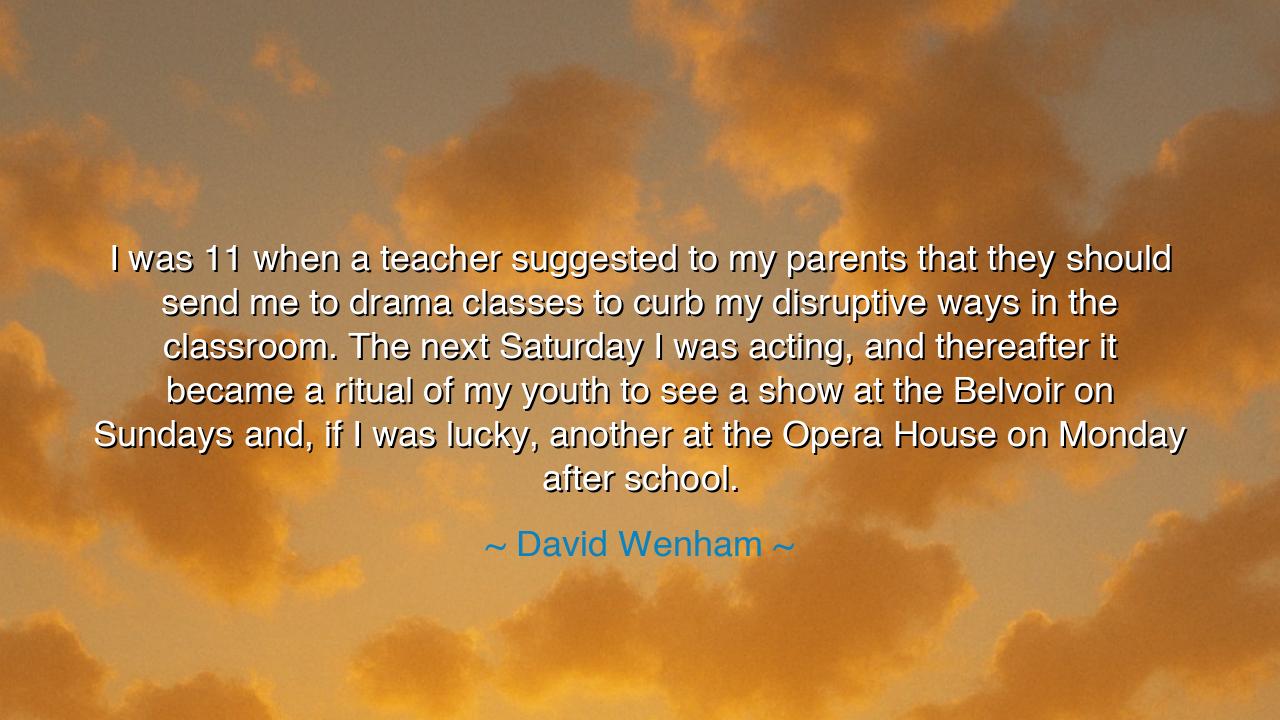
I was 11 when a teacher suggested to my parents that they should
I was 11 when a teacher suggested to my parents that they should send me to drama classes to curb my disruptive ways in the classroom. The next Saturday I was acting, and thereafter it became a ritual of my youth to see a show at the Belvoir on Sundays and, if I was lucky, another at the Opera House on Monday after school.






David Wenham, the actor who would one day walk the stages of the world and the screens of millions, once reflected on the origin of his path: “I was 11 when a teacher suggested to my parents that they should send me to drama classes to curb my disruptive ways in the classroom. The next Saturday I was acting, and thereafter it became a ritual of my youth to see a show at the Belvoir on Sundays and, if I was lucky, another at the Opera House on Monday after school.” These words, though simple in tone, reveal the powerful interplay of chance, guidance, and destiny. For in a single suggestion from a teacher, a restless child was given a direction, and from that direction blossomed a lifelong calling.
The origin of this quote lies in Wenham’s youth, when his spirited energy was a challenge within the ordinary confines of the classroom. To many, disruption is merely a problem to be silenced. But his teacher, rather than crushing that energy, sought to redirect it, to channel it into a form where it might find purpose. Thus was the door to drama opened, and with it, the discovery of a gift. What could have been a life marred by frustration became a life shaped by art, because one guide chose to see not only the flaw, but the potential hidden within it.
History is rich with such transformations. Recall Winston Churchill, whose teachers despaired at his unruly nature and poor performance in school. Yet one headmaster, rather than condemning him as hopeless, encouraged his love of language and history. That encouragement laid the foundation for the speeches that would one day rally a nation in its darkest hour. Like Wenham, Churchill’s early disruption was not eradicated but refined, transmuted into power. The lesson is the same: a teacher who sees potential in the storm of youth may redirect it into greatness.
Wenham speaks also of ritual, the habit of returning week after week to the theater, of making art not a passing hobby but a formative discipline of his youth. This is no small thing. For passion without structure is fleeting, but passion coupled with ritual becomes the rhythm of a life. The child who went to the Belvoir on Sundays and the Opera House on Mondays was not merely entertained; he was being initiated into the world of story, performance, and imagination. This ritual sowed seeds that would later blossom into mastery.
The meaning here is profound: within every disruptive child lies a force of energy that can either be wasted or transformed. Discipline alone may suppress it, but vision can redirect it. The wise teacher is not merely a guardian of order, but a discoverer of gifts. And when those gifts are nurtured with ritual, with steady exposure to greatness, the child is enlarged beyond his bounds. Thus, Wenham’s story is not only his own, but a parable for every restless soul who awaits the right stage upon which to stand.
What, then, shall we practice? As teachers, mentors, and parents, let us not only discipline, but discern. When we see disruption, let us ask what hidden fire drives it, and how it might be turned to light rather than destruction. As students, let us embrace the rituals that shape passion into purpose, returning again and again to the places and practices that awaken our souls. And as seekers of wisdom, let us remember that sometimes a single suggestion, spoken at the right time, can alter the entire course of a life.
Therefore, O children of destiny, hear the lesson of David Wenham’s youth: a restless boy, a perceptive teacher, a new path, and a ritual of art. From these simple elements was born a life of creativity and purpose. Let us honor those who guide us toward our callings, and let us seek in every disruption not merely trouble, but the possibility of transformation. For within the noise of youthful energy lies the seed of greatness, awaiting only the stage on which it may unfold.






AAdministratorAdministrator
Welcome, honored guests. Please leave a comment, we will respond soon